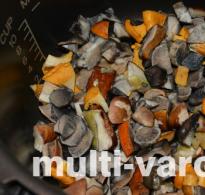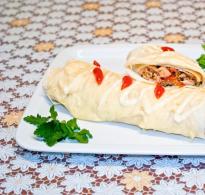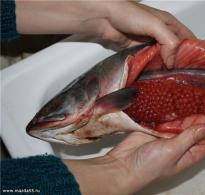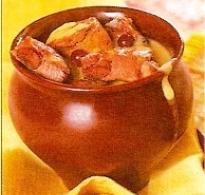Halal - what is the meaning of the word, features of industrial production of meat and food products. What is halal meat
Over the past few years, halal products have become increasingly available in stores around the world. “Permitted” products are in demand not only among Muslims, but also among Christians. In order to clearly understand what halal is in food, let us turn again to the concept of haram in food. True believers forbidden consume as food:
- Pork, as well as all derivatives that are prepared from the components pork carcass(gelatin, which is most often made from pork cartilage);
- Alcohol (including used as a flavoring - candy, canned food, meat marinated in wine);
- Animal blood;
- Carrion (meat of dead (not killed) animals);
- Insects, birds of prey, carnivorous animals (especially those feeding on carrion);
- Meat from animals killed without mentioning the name of Allah, in violation of halal rules.
Pay attention to the last point! Even if the animal whose meat you are planning to purchase belongs to the category of permitted animals, you must find out who killed it and how. Just because it's chicken doesn't mean it's halal. And a rabbit. And beef. And any other livestock. Only if you know for sure that the animal was slaughtered in compliance with Shariah norms and a believer, such meat is halal for you.
Some food coloring and additives made from insects containing skin, hair or fat from animals killed without proper regulations are also prohibited. Halal food must be natural, healthy and wholesome.
Halal meat and other products: features
The meat of “allowed” animals can turn into “forbidden” food. Let's figure out how halal meat differs from regular meat. “Clean” meat can be obtained if the rules slaughter:
- The animal must be healthy;
- The slaughter area must be perfectly clean;
- The slaughterer must be an adult, mentally healthy, have a sharp tool (sharpening a knife in the presence of an animal is prohibited!) and carry out the slaughter, causing the least suffering to the animal (only one incision is allowed in the neck area);
- Immediately before slaughter, the slaughterer must say: “Bismillah, Allahu Akbar!” (if the slaughterer is not a Muslim (which is allowed), he can say: “With God!”);
- All the blood must flow out of the carcass of a slaughtered animal, for which it is hung;
Halal meat production process strictly controlled representatives of the Spiritual Administration of Muslims or the Council of Muftis.
If everything is clear with meat, then what does “halal” mean on a package of rice or sugar? This can only mean one thing: the product does not contain any prohibited additives, dyes, or preservatives. This is especially important for sweets, vegetables, canned food and other products.
Be careful, buying confectionery: Most cakes and pastries contain alcohol, and gelatin is the basis of marmalade and marshmallows, not to mention jelly. This does not mean that such delicacies are forbidden for Muslims. Halal jelly (like marshmallow marmalade) is made from gelatin made from agar-agar seaweed or pectin (derived from peaches or apples).
Let's not let ourselves be deceived
Halal products are becoming increasingly popular. This fact is often exploited by unscrupulous manufacturers who use the words “halal” on labels. Frozen foods (manti, chebureki, dumplings, etc.) require special care. The contents may not correspond to what is written on the packaging.
Pay attention! The inscription “Muslim sausage” or “Muslim dumplings” does not mean that the product is halal! There must be a sign on the packaging confirming the permissibility of the food. For example, the mark of the Council of Muftis of Russia.
Every a halal product must be accompanied by a special certificate, which can be requested from the seller.
The word "halal" comes from the Arabic "al-halal", which means "permissible". Basically, this concept among Muslims refers to meat. For example, Islam prohibits eating pork, meat with blood, meat from animals that died naturally or strangled, and those who were slaughtered without uttering the name of Allah. You should also not eat the meat of land predators - for example, a tiger or a wolf. The consumption of certain parts of animal bodies, such as genitals, endocrine glands, and gall bladder, is also prohibited.
Kosher (kosher) food in Judaism is food that corresponds to kashrut - a system of ritual rules, in turn, corresponding to the commandments of the Torah. Thus, it is allowed to eat the meat of herbivores, which are both ruminants and artiodactyls. These are, for example, cows, sheep, goats. But it is forbidden to eat the meat of a pig, hare or camel. As for poultry, according to tradition, Jews eat only domestic birds - chickens, ducks, geese, turkeys and pigeons. The slaughter of livestock and poultry must also be carried out in compliance with many rules. Eating blood is prohibited, so the meat must be bled. A fish is considered kosher if it has scales and fins. Therefore, some types of fish (catfish, sturgeon, eel, shark) are not kosher, and neither is their caviar. Whales and dolphins are also not kosher, since they do not have scales, nor are any mollusks and crustaceans, since they have neither scales nor fins. It is strictly forbidden to eat insects, amphibians and reptiles (the Torah calls them sheretz - evil spirits).
Today in Russia you can often find products on sale labeled “kosher” or “halal”. Moreover, they are sold not only in specialized retail outlets. Many Orthodox Christians are interested in whether it is possible to buy and eat such products.
It is worth noting that Halal products can be eaten by people of any nationality and religion. For Muslims, the term “Halal” is, first of all, confirmation of compliance with Islamic traditions. The “Halal” label means that the product does not contain components prohibited for consumption by Muslims (pork, blood, etc.) and is a pure product of “Spiritual origin”. For non-Muslims, the first place comes high quality Halal products, because they are tasty, do not contain harmful preservatives and additives, and meet the requirements for shelf life and storage.
Products manufactured in accordance with Islamic norms are in demand not only by the two billion Muslim population of the Earth. Non-Muslims seeking a healthy lifestyle are also willing to purchase these products. For example, in the UK, six million people sell Halal products every year, although there are only two million Muslims. Not only meat, but also other products are marked “Halal”; Such products can be identified by a special badge. How is Halal meat different from regular meat?
Halal meat production involves:
Careful compliance with sanitary and hygienic rules at all stages of production;
Kind attitude and mercy towards the animal before, during and after slaughter;
Animals should be fed exclusively with natural food that does not contain hormonal or artificial additives or GMOs;
The animal is verifiably free of diseases that could harm human health;
Immediately before each animal is slaughtered, a short prayer is said;
The animal is killed by cutting the carotid artery; any other methods (electric shock, etc.) are prohibited by Islamic tradition. Everything must happen humanely, in one quick movement;
Blood is almost completely removed from the animal's body, in a natural way. When cooked, such bloodless meat acquires a slightly different taste - pleasant and refined; In addition, the absence of blood reduces the risk of developing fresh meat bacteria. It is believed that the meat of animals slaughtered according to Islamic canons is not only tastier, but also healthier for human health.
Modern food is replete with chemical flavors, flavor substitutes, dyes, preservatives, genetically modified ingredients, etc. As the effects of such substances on the human body are studied, many of them are recognized as unsafe, and some are downright carcinogenic. The situation is complicated by the fact that as the number of people on the planet increases, the demand for food resources also increases, while in relation to food production/consumption the principle of “faster, more, cheaper” prevails, which cannot but affect the quality of products.
But at the same time, reverse trends are also intensifying in the world: more and more people are trying to switch to healthy eating and learns to choose products responsibly in order to protect themselves and their children from negative consequences consumption of low-quality “chemicalized” food. In the West, particularly in developed European countries and the USA, the concept of “organic food” – organic, natural food – is gaining popularity. It is understood that such a product is not harmful to human body: vegetables do not contain nitrates, sausage and ham do not contain carcinogens and GMOs, yoghurts do not contain artificial colors, etc. All this has something in common with Halal standards. Halal is not just products of religious significance, but also food that meets modern environmental requirements. Currently, the production of Halal products around the world is given special attention, since this consumer market is very attractive.
Certification - the main means of guaranteeing compliance of products and services with Halal requirements - is carried out on a voluntary basis based on an agreement between the applicant and the Halal Certification Center at the territorial religious (Muslim) departments. The “Halal” certificate confirms the compliance of manufactured products with sanitary, hygienic, technological, religious requirements and is issued after a thorough examination by experts of all stages of production of Halal products at the enterprise (including fattening and slaughter of animals), as well as the conditions of storage, packaging, and transportation of products.
Halal or halal is a word translated from Arabic meaning “permitted.” Modern people mistakenly, out of an old habit, associate this resolution exclusively with food. A righteous Muslim is guided by this principle in everything: in choosing a job, a bride, clothes. And yes! Of course in nutrition.
To put it simply, halal is a seal of quality that tells a Muslim that the products purchased are made in accordance with all religious requirements. However, lovers healthy food also fell in love with products approved by Allah himself. As demand increases, supply also increases. “Halal” signs are appearing more and more. Meat producers are trying especially hard. After all, this is the most expensive and tasty piece of the market.
What should a devout Muslim not eat?
What is halal and what is haram (forbidden) is determined individually by different Muslim schools, but they agree on the main points. Turning to Islamic traditions, we get the following prohibited list:
- meat of animals that died by natural causes;
- meat of animals that died as a result of electric shock, strangulation, poisoning, beatings;
- pork meat;
- meat of an animal slaughtered in violation of Muslim regulations;
- meat of predatory animals and birds;
- dog meat;
- meat of donkeys and mules;
- blood (except for that which remains in the muscles of a properly slaughtered animal).

Added to the above are alcohol and substances that have a narcotic effect on the human psyche. Nothing criminal or mysterious yet. In addition to Muslim regulations. So how do you get halal meat?
The secret of halal meat
The process is based on hygiene. Islamic traditions require monitoring cleanliness and compliance with all sanitary and hygienic standards. It is prohibited to slaughter sick animals. For food meat is coming only healthy and strong individuals.
Contrary to popular misconceptions, Muslims treat living creatures humanely. Organizing comfortable living conditions is one of the conditions for preparing for slaughter. The food chosen for the animals is only natural, without GMOs or artificial additives (this is not broiler chicken). Cruelty is also prohibited. The happier the cow, the more halal its meat.
Before slaughter, they try to calm and distract the animal. A short prayer is read, and then the animal is killed in one motion, cutting the carotid artery and esophagus. Death occurs quickly, and the meat is not poisoned by adrenaline. Removal of blood occurs naturally, which, without antibiotics, saves the meat from the spread of bacteria.
The result is completely environmentally friendly pure product. There is no doubt about the benefits and naturalness of such meat. And in taste qualities especially. It's no wonder that more and more people prefer
This term confirms that the meat is produced in full accordance with customs and Islamic canons. It does not contain those components that cannot be eaten by a Muslim (haram). Halal chickens are a product that is pure both physically and spiritually. And by the way, not only Muslims, but also people of other religions can eat it.
What is "halal"
This meat is considered very healthy. An animal that is butchered in accordance with this tradition is completely bled dry. It has pinkish tints. Blood, as is known, is a favorable environment for the development of bacteria, including pathogenic ones. The process of their reproduction can begin within a few minutes after decapitation of the bird, and it is of a striking nature. Halal chickens do not have this disadvantage. In addition, meat has a number of other important characteristics.

Halal products
According to Islamic traditions, only absolutely healthy animals that are fattened without the use of biological additives, that is, special feed, should be eaten. Only they must be cut up with complete bleeding. According to Islamic rules, halal chickens require strict adherence to ritual slaughter. At the same time, the name of the Almighty is mentioned. It is also mandatory to cut the arteries of the neck and completely bleed each carcass.

Which face is used?
Today, poultry farms use 2 types of slaughter: manual and mechanical (with a disk knife). The slaughterers must be of Muslim faith (however, Jews or Christians are allowed).
Manufacturers, of course, use the automatic method more readily than the manual method, since it is more effective. Once delivered from the poultry houses, they are hung by the legs on a conveyor belt. Then, under the guidance of experts in standards in carrying out this process, one of the workers reads a prayer.
After this, the dispatcher presses the button, and the suspended bird enters the conveyor. And they kill the bird. To the disadvantages this method This means that halal chickens arriving for slaughter can vary in size, meaning that a knife rotated like a hand mill will sometimes make cuts that result in the birds' necks being completely cut off. According to Sharia, such a carcass becomes unlawful for food. In addition, cuts made not at the junction of the heads with the necks, or improperly cut meat can result in poorly bled meat. In this case, it will be condemned and prohibited for consumption.
But during ritual slaughter by hand, the worker makes a deep cut with a knife blade along the neck so that the carotid artery and jugular vein are simultaneously involved. Immediately before slaughter, the name of the Almighty and a prayer are pronounced. If this is not said, then the meat is considered haram.
Birds are not butchered until the blood has drained from the bodies. And the correctness of the process itself, the temperature and time conditions, the thoroughness of gutting, and further packaging in packaging bags at the poultry farm are strictly monitored by the controllers of the Halal Standard Committee.






